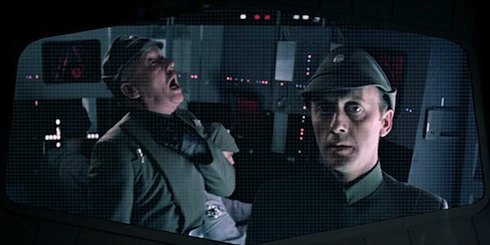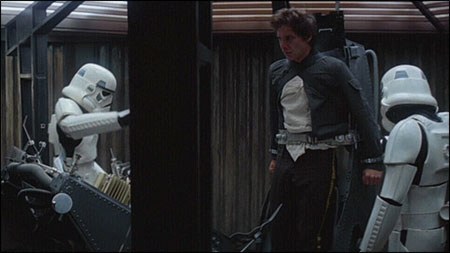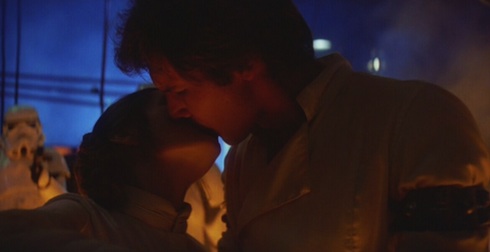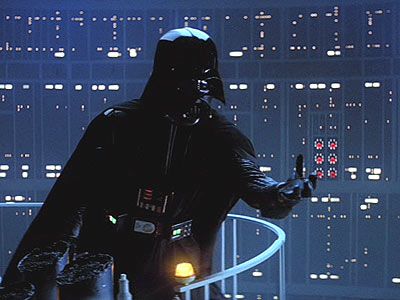The Empire Strikes Back consistently makes it onto everyone’s Top Ten Science Fiction Films of All Time lists, and most fans and critics insist that it’s the best of all the Star Wars films. While debating that topic is a lost cause these days, Empire is certainly an example of how a sequel can not only be just as good or better than it’s predecessor, but how a great sequel can transform an audience’s understanding of a fictional environment. Empire proved to moviegoers that the Star Wars universe was a much darker, far more complex place than they had originally anticipated, full of war, betrayal and death. It showed the audience that being a band of rebels fighting for freedom means that most days you don’t blow up the Death Star. Most days, you abandon your base, your friends die all around you, and you have nothing to show for it except the fact that you’re alive. For now.
While that may have been a bit much for the movie-loving world initially (critical responses to the film were decidedly mixed when it first reached theaters), it grew in popularity over time. The middle chapter of that galaxy far, far away featuring a crushing defeat for the Alliance, a cliffhanger for the key romance, and an effective dressing down of the hero was something that no one had ever seen before. It also contained one of the greatest reveals in cinema history, one that was debated up until the release of Return of the Jedi: Is Vader Luke’s father? Is he lying? If he’s telling the truth, why would Obi-Wan lie? But despite all of that, there is a problem with the Episode V that no one is willing to talk about. It’s fairly simple when put down on paper:
The Empire Strikes Back has created an expectation in three-part storytelling that has weakened or outright destroyed many film trilogies that have followed it.
How many times have you been checking the buzz about a sequel and watched this phrase get tossed into the mix to rile up the viewership: “It’s going to be the Empire Strikes Back of the series.” What does that mean, exactly? Of course, you can make a few assumptions: a) it will be darker than the first film, b) it will contain unforeseen twists, c) the ending will likely be a cliffhanger and something of a downer. In fact, there is a general expectation that the second part of a trilogy will always follow the “darker before it gets lighter” mentality. While that is a natural function in good storytelling, it doesn’t mean that the entire second film needs to be a paragon of misery and brutal life lessons. But Empire is the film to beat in Trilogy Land, so Hollywood follows to the tune of the Imperial March every time.
Take Back to the Future II, for example. Plenty of fans were disappointed when this film came out, and it’s easy to understand why; the alternate reality caused by Marty leads to a future in which Biff Tannen has turned Hill Valley into a Gotham City lookalike. Watching Marty’s mother put up with Biff’s abuse and seeing Marty powerless to stop his temper and homicidal tendencies are a far cry from what audiences received in the first Back to the Future movie.
While it’s not all that hard to imagine Biff becoming that sort of criminal, it does beg the question: why? Why did this movie need to be so depressing? Love it or hate it, it does seem like a bit of a stretch to jump from a light-hearted harkening back to saddle shoes and rockabilly into a reality where Biff is entertaining prostitutes in his jacuzzi and explaining, in detail, how he shot George McFly with the same gun he plans on using to kill Marty.
But Darth Vader killed an officer for every day of the galactic week in Empire, so we’re good, right?

Indiana Jones is another obvious contender here. Even Steven Spielberg willingly admits that Temple of Doom is the weakest adventure for our intrepid archaeologist, and the more gruesome elements of that story probably have a lot to do with it. Indiana Jones fought Nazis in the first film, but it looks like tearing a person’s heart out of their chest and beating child slaves might be just a little bit darker than even those swastikas were capable of providing. Frankly, the Nazis in Raiders of the Lost Ark were treated with quite a bit of good old-fashioned tongue-in-cheek; the French potshots at their pet archaeologist Belloq, the potential torture devices that turn out to be coat hangers, the obsession (in German) over the state of Indy’s stolen undersized uniform.
But in Temple of Doom, Indiana Jones gets mind-controlled after tripping on god blood, he and his kid sidekick get whipped side by side, and we see a guy get dropped into a fiery pit of lava while he’s praying for his life. Even in terms of globe-trotting adventures, that could be termed a little extreme, especially when you’re viewing it live on screen (and especially before the advantage of a PG-13 rating).
But Han Solo was tortured on Cloud City in Empire—it’s probably fine.

Even the trilogies that many people take issue with altogether still fall into this trap. What about The Mummy? Even if it’s not your favorite, the first film was fun if you’re a fan of camp and plucky, wise-cracking heroes. It’s nothing like the Boris Karloff original, but if you’re not expecting it to be, you can have a good time. In The Mummy Returns, however, we see Evey O’Connell get murdered in front of her husband and son. She comes back, of course, but not before we’re treated to the sight of Rick O’Connell sobbing over his wife’s lifeless body. Then there’s my personal favorite turn in the plot, when Anck-Su-Namun leaves Imhotep to die, thereby nullifying the romance that had driven the entire first film. So much for everlasting love.
But Princess Leia loses Han in Empire right after admitting her feelings for him, so this must be romance done right.

I’ve already talked about how the Pirates of the Caribbean trilogy ran into this exact problem; it might even explain how vehement the negative reviews are for the current installment—people just stopped caring and lost faith in the series. Dead Man’s Chest is surely the darkest of the Pirates movies, and perhaps the most confusing of all the plotlines is Will’s determination to redeem his condemned father, Bootstrap Bill Turner. This, mind you, is after his father is forced to whip him in front of Davy Jones’ crew. (Whipping again. Apparently it’s a good way to get anguish across without having to kill anyone.) Will’s desire to save his father is more aggravating than anyone else’s plotting during the film because his desperate need to be heroic is simply getting in the way; why couldn’t he just let Jack stab the heart and ask him to free his father once he’s captain of the Flying Dutchman? It would have unfortunately negated that fantastic three-way sword fight, but the plot would have been a whole lot less convoluted.
But then, in Empire, Luke was horrified by the sudden knowledge that his father was a monster too, so Will’s journey obviously makes sense.

I am not endeavoring to make a case that all of these films are inherently awful, but I think the trend is lamentable. There is no real reason why the second installments of trilogies need to be such a complete turnaround from the initial material presented in the first films. There is only one Empire Strikes Back. Nobody is going to make the next one. Just because audiences liked Empire doesn’t mean they will be automatically disappointed by a second film that refuses to repeat that configuration.
The Empire Strikes Back deserves respect. It deserves a tender place in the memories of SFF and film fans everywhere. It also deserves to be a unique entity in filmmaking. In this case, imitation is not the best form of flattery. Please: use Empire with caution.
Emmet Asher-Perrin’s parents used to call her Yoda when she was a baby. The wrinkles probably had something to do with it, but she can’t imagine her ears actually looked like that. You can bug her on Twitter and read more of her work here and elsewhere.









